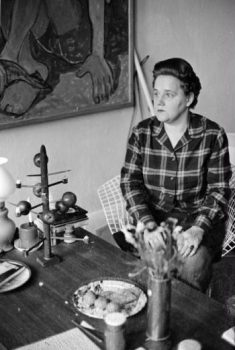Archive for March, 1977
A Wedding Dance
Issue 1/1977 | Archives online, Fiction, Prose
An extract from the novel Kivenpyörittäjän kylä (‘The stoneroller’s village’). Introduction by Hannes Sihvo
Pölönen got up and went over to his accordion, which he had dumped beside the juke-box. He walked with his stocky trunk thrust forward, his hands dangling; the wallet he had crammed into his hip-pocket, constrained to follow the curve of his fat buttock, made an unsightly bulge suggestive of some kind of excrescence. With a vigorous shoulder movement he hoisted the instrument into position. At once the neck of the bottle in his inside pocket came into view, emitting spurts of foam, and it was some time before he noticed it and managed to nudge it back so that it would lean the other way. Scarlet in the face and streaming with sweat, glaring angrily and doing his utmost to avoid looking in the direction of the assembled company, Pölönen drew some air into the bellows and tried out various notes and chords, fingering the keyboard with an airy nonchalance intended to suggest that he was a complete master of his instrument. All eyes were turned upon this podgy, fair-haired man, with the suit that was far too tight across the shoulders and under the armpits, the very small and rather crumpled tie, the tapering trouser legs with shiny bulges at the knees. The warming-up process continued for what seemed an unconscionably long time, and a certain amount of shuffling and coughing began to be audible; old Nestori Pölönen gazed stiffly down at his shoes, and Saara’s movements, as she busied herself behind the coffee-table, became more and more fidgety. More…


